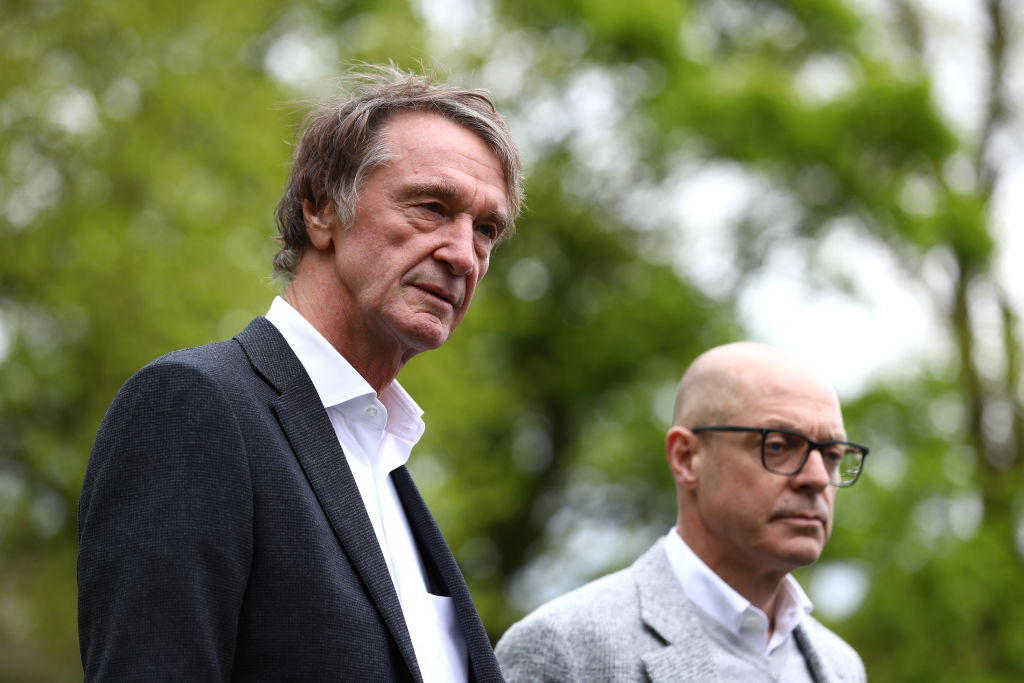Vuelta a España: 6 key stages where the race was won
Cyclingnews highlights the key moments of Primoz Roglic's victory
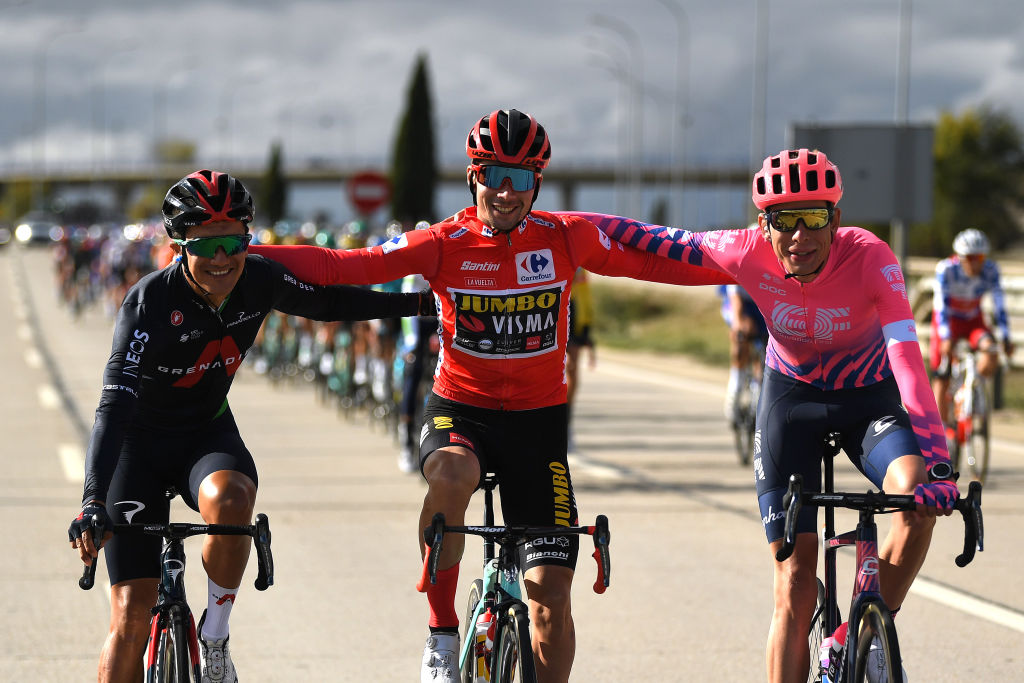
The latest race content, interviews, features, reviews and expert buying guides, direct to your inbox!
You are now subscribed
Your newsletter sign-up was successful
Tadej versus Primož, Tao versus Jai, Primož versus Richard. Each of the Grand Tours in this most turbulent, fragile, stressful road-racing season has ended in a dramatically close showdown between the two best-placed riders overall. And the 2020 Vuelta a España was no exception to that rule.
While the Giro and Tour's last-minute cliffhangers effectively developed into a two-way duel, the Vuelta had even more options on the table right the way through to the finish in Madrid.
Primoz Roglič's second Grand Tour victory in Spain this wasn't anything near as straightforward as in the Vuelta of 2019. The list of pre-race favourites was far longer, the route tougher, the weather and the time of year more uncertain, and Roglič's Tour de France defeat was hardly a guarantee of solid consisitency.
Ultimately, for the fans, that was no bad thing at all: last year's Vuelta was essentially all over bar the shouting after the stage 9 time trial. This time around, nobody knew for certain who would finish where on the podium right up to 24 hours before Madrid. All the way, we could sense how tough a race this was to try to win.
Richard Carapaz and Ineos continually took the race to Roglič, testing his limits and those of his Jumbo-Visma team.
Hugh Carthy (EF Pro Cycling) was the 'discovery' of the race and yet another challenger for Primož Roglič, who was never outside the minute barrier all the way to Madrid. Even a non-conformist like Dan Martin (Israel Start-Up Nation), en route to his best-ever GC result in a Grand Tour, could never be ruled out.
As for Movistar, they might not have had a clear and direct challenger to Roglič's supremacy, but like the unruly kids at the back of the classroom, their constant and colourful disruption of lessons made it much harder for everybody else to concentrate on getting a good result.
The latest race content, interviews, features, reviews and expert buying guides, direct to your inbox!
The other massive uncertainty, of course, was whether the race could make it to Madrid as the pandemic deepened across Europe, and notably across Spain.
To have managed to do so not only speaks volumes of the organisation's ultra-careful planning and implementation of the race's anti-COVID-19 measures, but it also offers a ray of light when it comes to holding races safely in 2021.
In that one crucial sense, no matter who finally laid claim to the leader's jersey in the Vuelta a España, on the evening of November 8, as the peloton ground to a halt for one last time in Madrid's Paseo de la Castellana boulevard, you could say everybody in cycling had won something very valuable indeed.
Cyclingnews highlights the six key moments that led to Primož Roglič’s second Vuelta a España victory.
Stage 1: Primož Roglič wins atop Mount Arrate
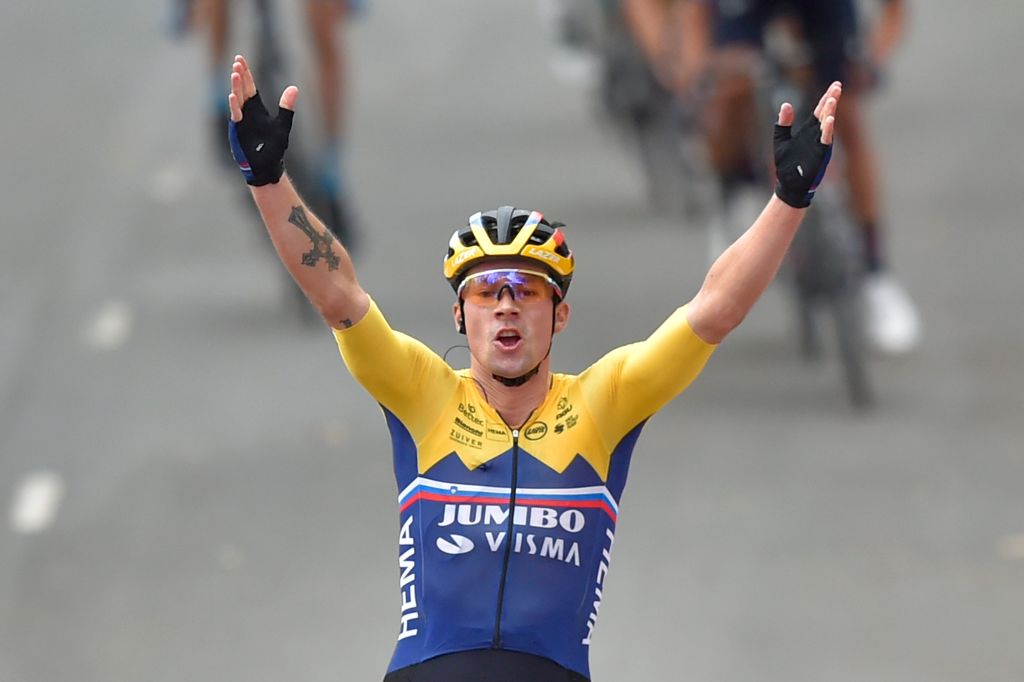
The first of Roglič's four Vuelta stage wins could not have come earlier, and it was the one that set the tone for the days to come.
Roglič formed part of a group of eight favourites as they approached the summit of the emblematic Basque Country finish. And as soon as they were on the fast downhill to the finish at the sanctuary a couple of kilometres further on, he was gone.
His winning margin was a scant second, but it enabled him to start the Vuelta as he had ended it in 2019: in red. The first 10 seconds of time bonuses – ultimately another vital ingredient in his success – fell his way that day, too.
Roglič's confirmation that he meant business in the Vuelta also came as some of the other major heavyweights on the race's start-list fell by the wayside.
Thibaut Pinot (Groupama-FDJ) and Chris Froome (Ineos Grenadiers) both lost massive amounts of time. Roglič's teammate Tom Dumoulin was also nearly a minute off the pace, rendering any debate about Jumbo-Visma's hierarchy in the Vuelta all but irrelevant. A little over a week later, while Froome battled courageously onwards all the way to Madrid, Dumoulin, like Pinot, had pulled out.
Stage 6: Carapaz and Carthy regain time on Roglič at Formigal
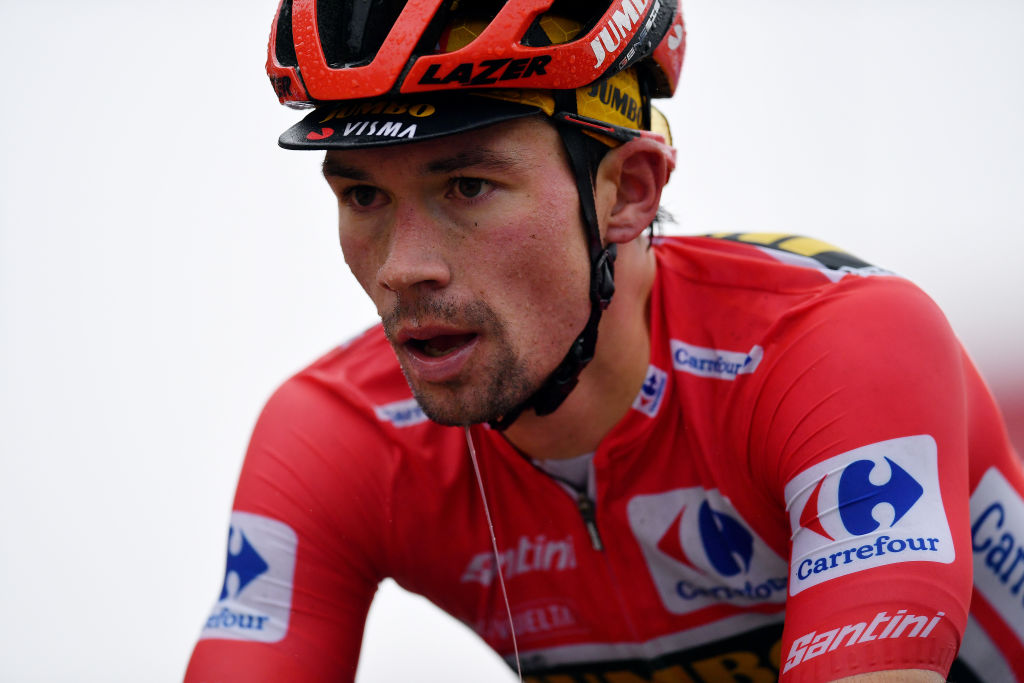
It was disappointing when the Vuelta a España's hardest summit finish of 2020, set to finish atop the Col du Tourmalet on stage 6, was cancelled. But fortunately the substitute finish on a rainlashed Formigal offered a scintillating alternative.
In Ineos Grenadiers' best manouevre of the entire Vuelta, Richard Carapaz and teammate Andrey Amador launched an inspired downhill attack just before the Formigal. Already on the backfoot and with his team struggling to keep him in place after struggling to don a rainjacket, Roglič was exhausted when he finally managed to sneak back into the peloton at the foot of the Formigal.
His rivals proved merciless.
Movistar attempted to make the most of Roglič's near-isolation and then Carapaz roared away on the hardest, upper segment of the Formigal to claim the lead as the Slovenian struggled.
However, it was Carthy – eighth on the stage – who was the best of all the overall contenders, confirming his GC ambitions with a five-second gap on the Ecuadorian and a 50-second gap on Roglič.
Roglič could only finish 20th – and it would later prove to be his worst day of the entire Vuelta.
Stage 8: Roglič outpowers Carapaz at Moncalvillo
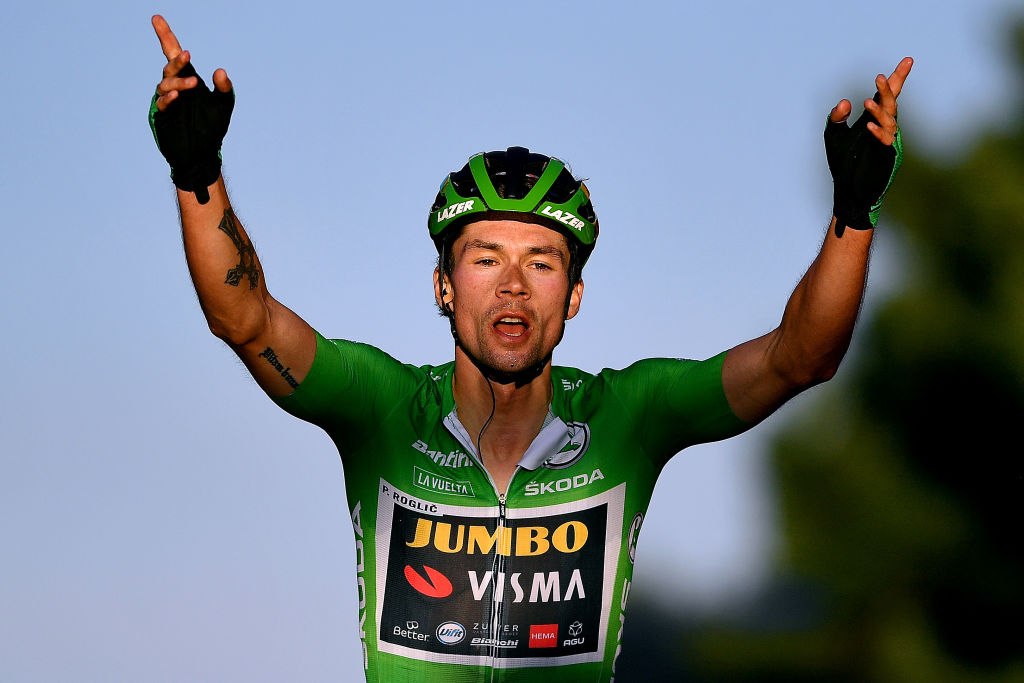
Thirteen seconds. That was the comparatively minimal size of the gap between Roglič and Carapaz at the Vuelta's fourth of seven summit finishes, as the Slovenian began the process of clawing back time on the Ecuadorian on the little-known, densely wooded Alto de Moncalvillo in northern Spain.
As Roglič stormed around the final long, left-hand bend to the finish for his second stage win, psychologically it represented a massive boost to his morale.
At Formigial, Roglič had lost the lead and, with it, the aura of near-invincibility he had created by winning on day one of the Vuelta. But three days later, he was back in the game with a vengeance.
Carthy had tried to shatter the favourites group on the middle section of the Moncalvillo. But in one of the most memorable climbing battles of recent Vuelta, it was the 2019 Giro d'Italia winner, Carapaz, who actually succeeded in going clear, 750 metres from the summit, and then Roglič who countered his second attack with a lone charge of his own. Try as Carapaz might to chase down Roglič on the long, unbearably straight approach road, he could not do so.
Dan Martin also confirmed he was playing a long game in the GC battle with third place behind Roglič and Carapaz, while Movistar once again did a massive amount of work early on, only for their leader, Enric Mas, to falter at the final hurdle.
But it was Roglič’s best mountain performance of the entire Vuelta, three days after the near-crisis in Formigal, that mattered the most.
Stage 12: Roglič falters but fails to crack on the Angliru
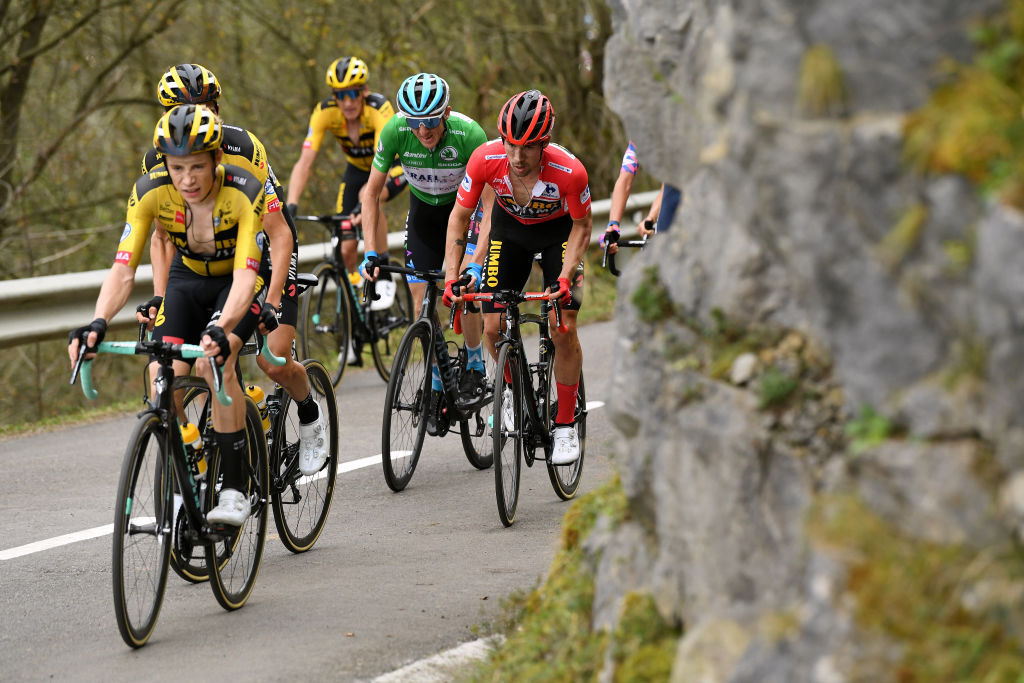
Defeat can often lead to collapse in Grand Tours but Primoz Roglič's loss of la roja on the Angliru was more of a stumble than free fall.
Yes, the Jumbo-Visma leader lost the Vuelta a España lead for the second Sunday running to Carapaz, and yes, Carthy's hard-fought triumph on the summit of Spain's hardest climb made it plain that the Briton was a serious candidate for overall victory. But after struggling in the last kilometres of the ultra-steep ascent, Roglič's losses to Carapaz, turned out to be limited. Very limited. Carapaz's advantage on Roglič at the summit of the Angliru was a mere 10 seconds.
Carthy had moved up to third overall, too, but Roglič – despite dropping out of red – was in nowhere near as much trouble as his rivals needed him to be. Instead, with a time trial fast looming at the start of the third week, from this point on, Slovenian's biggest rival was arguably himself.
Stage 13: Not La Planche, not Pau, but Roglič sustains the pace in the final TT
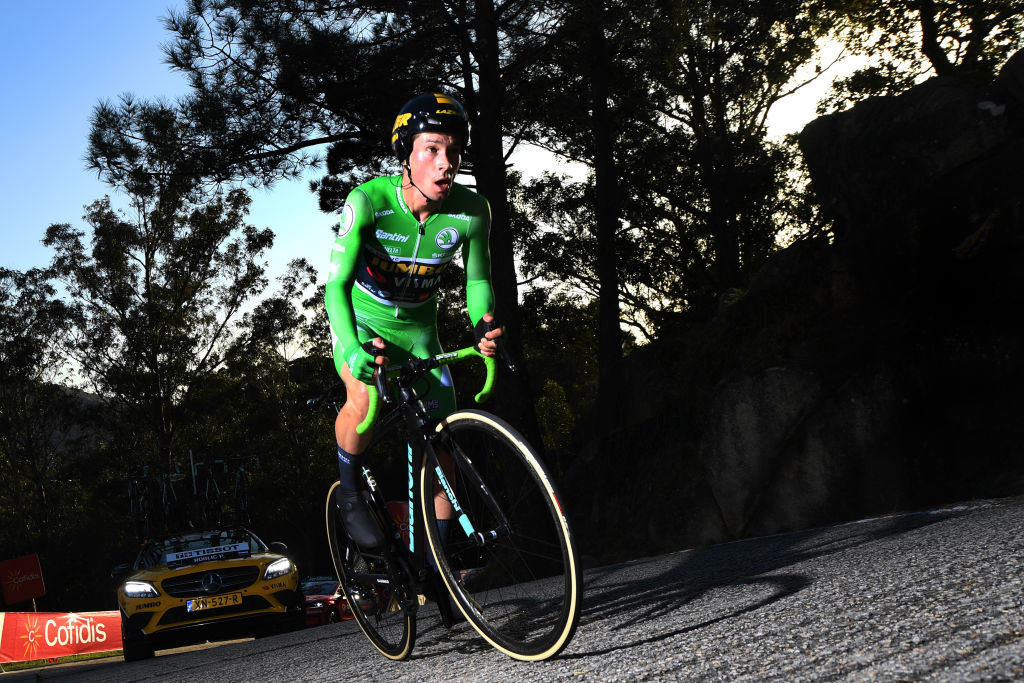
If there's an unofficial award for the worst sporting bad luck in 2020 out there somewhere on the Iiternet, make sure you vote for Will Barta (CCC).
Thanks to a brilliant time trial, the young American was on the point of claiming his first professional win at the summit of the Ezaro dam last Tuesday, when Primoz Roglič stormed across the finish line to snatch the victory by a mere one second and push Barta back to second in the process.
For Barta, victory in a Grand Tour TT would have been a breakthrough result, but became Roglič’s fourth victory of the Vuelta and marked a turning point as well. Victory put him back in the driving seat in the GC and ahead of Carapaz by 39 seconds.
Carapaz had ridden brilliantly to limit his losses to less than a minute, and Carthy, arguably even more notably, had actually taken time back on Roglič at the first checkpoint en route to a stunning fourth place at the finish. Only Dan Martin slid out of the GC frame a little as he lost 1:17 to Roglič, In such a tightly fought Vuelta, that was a big hit.
Roglič got a major monkey off his back: the disaster at La Planche des Belles Filles, where he had lost the Tour de France to countryman Tadej Pogačar (UAE Team Emirates) at the last moment possible, was eased.
He was nowhere near as dominant as in the Pau time trial at last year's Vuelta, but in a race where nobody seemed able to get a massive time gap on their rivals, after Ezaro, the Vuelta was Roglič to lose again. And there were only five days left to go.
Stage 17: Roglič stays in command on La Covatilla
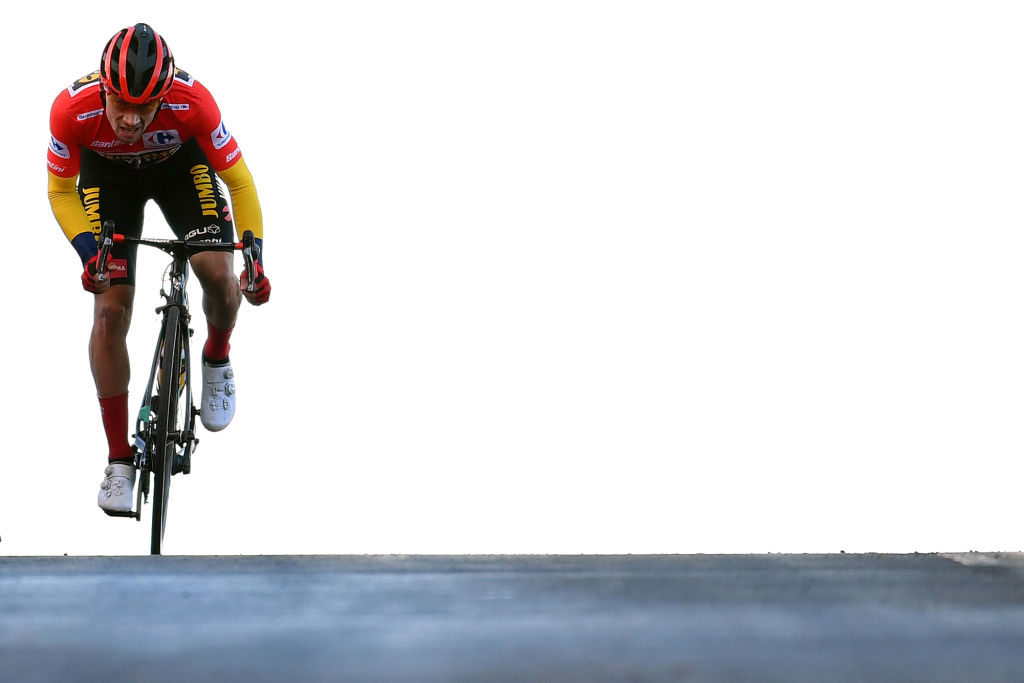
At the summit of La Covatilla on Saturday, when Primoz Roglič said a "special thanks" to his Dutch teammate Lennard Hofstede, this wasn't just a chance compliment.
Just after Carapaz attacked, two kilometres from the Covatilla summit, Roglič looked to be on the point of suffering a major climbing crisis. Isolated from his teammates, the gap between him and Carapaz was increasing remorselessly. The 45 seconds that looked like an unbreachable time-wall between him and the Ecuadorian was crumbling fast, just when the Slovenian had seemed to be on the point of claiming his second Grand Tour victory.
Three other factors, apart from Hofstede, helped limit the damage. A howling headwind made it nearly impossible for his rivals to attack, as a frustrated Carthy commented later. Movistar's appearance on the scene, when Roglič was able briefly to latch on to Enric Mas and Marc Soler as they fought for a near-impossible fourth place in the Vuelta GC for Mas, was timely too. Both helped Roglič, who seemed to regain ground on Carapaz as the summit approached.
However Hofstede mattered a lot too. He was part of the massive early break and so was perfectly positioned in the closing kilometres of the final summit finish of the Vuelta to help Roglič just when he needed it most.
The assistance might have been no more than a minute or two. But it gave the Jumbo-Visma leader the moment of protection he needed to then keep Carapaz within reach for one last, vital occasion before then digging deep to find his own final reserves of energy.
Carapaz pulled back 15 seconds but Roglič kept the overall lead by 24 seconds.
After that, the Vuelta really was all over bar the celebrations and podium ceremony in Madrid.
Alasdair Fotheringham has been reporting on cycling since 1991. He has covered every Tour de France since 1992 bar one, as well as numerous other bike races of all shapes and sizes, ranging from the Olympic Games in 2008 to the now sadly defunct Subida a Urkiola hill climb in Spain. As well as working for Cyclingnews, he has also written for The Independent, The Guardian, ProCycling, The Express and Reuters.

